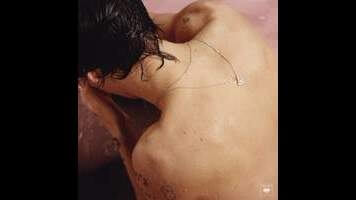Harry Styles takes a bold step forward by leaning on the past in his solo debut

There are myriad reasons why Harry Styles is the most popular and recognizable member of One Direction. Chief among them, however, is the utmost respect he has for the band’s (primarily) teenage girl fan base. “Who’s to say that young girls who like pop music—short for popular, right?—have worse musical taste than a 30-year-old hipster guy?” he mused to Cameron Crowe in Rolling Stone, an interview in which he also calls girls “our future. Our future doctors, lawyers, mothers, presidents—they kind of keep the world going.” Speaking to The New York Times, Styles reiterated this stance: “I just think it’s a little naïve to just write off younger female fans, in particular, in the way people do. Like I’ve said, young girls were massive fans of the Beatles. It’s crazy to think that they’re not intelligent.”
Styles can relate to being underestimated, as he doesn’t receive much respect for his own, omnivorous musical tastes. He’ll listen to artists such as Shuggie Otis and Keith Whitley in the car, Rolling Stone observes, while Harry Nilsson’s work was omnipresent as Styles was crafting the record. “[Nilsson’s] lyrics are honest, and so good, and I think it’s because he’s never trying to sound clever,” he told USA Today. For the NYT, he name-checked “Pink Floyd, Beatles, Stones, Fleetwood—all the stuff I grew up listening to” as influences on his first solo debut.
It would be tempting to suggest that Styles—an erstwhile boy bander whose group was assembled, right before the cameras, for The X Factor—is striving to present himself as more “authentic” here, attempting to lend his solo career more artistic credibility. But that’s an overly simplistic (if not a little condescending) way of approaching Styles and, by extension, Harry Styles. Well-crafted songwriting isn’t the exclusive domain of classic-rock icons, for starters, and One Direction always dabbled in blurred genres. The group’s 2013 song “Little Black Dress” is a ’70s power-pop barn burner, for one, while during a recent Today appearance, Styles and his solo band even worked up a rocked-out version of 1D’s moody pop confection “Stockholm Syndrome.”
So it’s no surprise that the thoroughly entertaining Harry Styles falls in the vein of a ’70s singer-songwriter record of the sort you’d expect from those classic influences, only with a production that gives it a contemporary sheen. Crisp acoustic and electric guitars are prominent in the mix, burnished with occasional piano, sweeping orchestral color, textured percussion, and gooey harmonies. Styles and his co-conspirators (including Kanye West and Fun. collaborator Jeff Bhasker, the record’s executive producer) smartly take a holistic approach to the diverse sounds and styles of that decade. In many ways, Harry Styles resembles a Time Life ’70s rock collection.
Standout “Only Angel” makes it clear why Styles did such a convincing Mick Jagger impression on Saturday Night Live: The song is a swaggering powder keg of glammy rock ’n’ roll with cowbell, hand claps, and falsetto croons. “Kiwi” is a gleeful blues-rock stomp with jagged electric guitars, while the smoldering “Woman” is a hybrid of Elton John-caliber blue-eyed soul and funky modern R&B. Elsewhere, the record nods to sparse folk (“From The Dining Table,” “Sweet Creature”), glam-burnout ballads (“Sign Of The Times”), lightly psychedelic rock (“Meet Me In The Hallway”), and majestic power-pop (“Ever Since New York”).








































